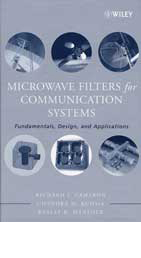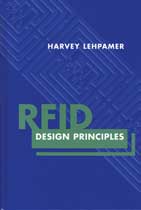Microwave Filters for Communication Systems: Fundamentals, Design and Applications
R.J. Cameron, C.M. Kudsia and R.R. Mansour
Wiley Interscience • 802 pages; $135
ISBN: 978-0-471-45022-1
 This book captures the fundamentals and practical aspects of modern microwave filter design. Chapter 1 is devoted to an overview of communication systems. The principles that unify communication theory and circuit theory approximations are explained in Chapter 2. Chapter 3 describes the synthesis of the characteristic polynomials to realize the classical maximally flat, Chebychev and elliptic function low pass prototype filters. Chapter 4 presents the synthesis of characteristic polynomials of low pass prototype filters with arbitrary amplitude response using a computer-aided optimization technique. Chapter 5 provides a review of the basic concepts used in the analysis of multiport microwave networks. Chapter 6 reviews some important scattering parameter relations. In Chapter 7, filter synthesis based on the [ABCD] matrix is described.
This book captures the fundamentals and practical aspects of modern microwave filter design. Chapter 1 is devoted to an overview of communication systems. The principles that unify communication theory and circuit theory approximations are explained in Chapter 2. Chapter 3 describes the synthesis of the characteristic polynomials to realize the classical maximally flat, Chebychev and elliptic function low pass prototype filters. Chapter 4 presents the synthesis of characteristic polynomials of low pass prototype filters with arbitrary amplitude response using a computer-aided optimization technique. Chapter 5 provides a review of the basic concepts used in the analysis of multiport microwave networks. Chapter 6 reviews some important scattering parameter relations. In Chapter 7, filter synthesis based on the [ABCD] matrix is described.
In Chapter 8, the concept of a N x N coupling matrix is presented. Chapter 9 develops methods of similarity transformation to realize a wide range of topologies. Two unusual circuit sections are introduced in Chapter 10. Theoretical and experimental techniques for evaluating the resonant frequency and unloaded-Q of microwave resonators are described in Chapter 11. Chapter 12 addresses the synthesis techniques for the realization of low pass filters. Chapter 13 deals with the practical design of dual-mode bandpass filters. Chapter 14 presents the use of EM simulators for designing microwave filters. Chapter 15 offers several techniques for EM-based design of microwave filters. Chapter 16 develops the design of dielectric resonator filters. Chapter 17 deals with the analysis and synthesis of allpass networks. Chapter 19 is devoted to the computer-aided techniques for tuning microwave filters. Chapter 20 deals with the high power considerations in the design of microwave filters and multiplexing networks.
To order this book, contact:
John Wiley & Sons Inc.
One Wiley Drive
Hoboken, NJ 08875
(800) 225-5945
RFID Design Principles
Harvey Lehpamer
Artech House • 283 pages; $99, £55
ISBN: 978-1-59693-194-7
 Radio frequency identification (RFID) is an emerging technology and one of the most rapidly growing segments of today’s automatic identification data collection (AIDC) industry. However, this emerging technology is not new; in fact, it is currently being used in numerous applications throughout the world. It was originally implemented during World War II to identify and authenticate allied planes in an identification system known as Identification, Friend or Foe.
Radio frequency identification (RFID) is an emerging technology and one of the most rapidly growing segments of today’s automatic identification data collection (AIDC) industry. However, this emerging technology is not new; in fact, it is currently being used in numerous applications throughout the world. It was originally implemented during World War II to identify and authenticate allied planes in an identification system known as Identification, Friend or Foe.
RFID usage is steadily increasing and companies across many industries are now looking at RFID to streamline operations, meet regulatory requirements and prevent the introduction of counterfeit products into the supply chain to protect both customer safety and company profitability. Industry experts view RFID not as competition with, but as a complement to barcode technology. RFID technology, in fact, overcomes certain limitations found in some barcode applications. This book introduces prospective users and system designers to the basics of RFID technology, including applications, benefits, technical characteristics, security and privacy, and standardization, design and implementation of RFID’s technical and economic challenges. Numerous issues beyond the detailed technical and sheer operational capabilities of RFID must be considered. Due to the large number of considerations that must be undertaken, only a few intangible and theoretical considerations, such as security, privacy, social, ethical and future considerations are presented. In addition, a wide number of new and exciting topics and concepts are briefly introduced, some of them, at least at this point, only marginally of interest to RFID, with the hope of piquing readers’ interest in pursuing these new technologies.
To order this book, contact:
Artech House
685 Canton St.
Norwood, MA 02062
(781) 769-9750 ext. 4030; or
46 Gillingham St.
London SW1V 1HH, UK
+44 (0) 207-8750
